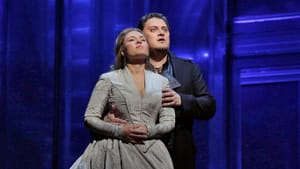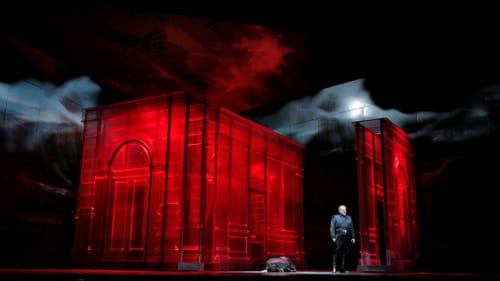Stay in the Loop
BSR publishes on a weekly schedule, with an email newsletter every Wednesday and Thursday morning. There’s no paywall, and subscribing is always free.
Is blackface necessary?
Verdi's 'Otello' at the Metropolitan Opera

The portrayal of Otello as a white man in the new Met production of Otello is absurd. The whole point of Shakespeare’s (and Verdi’s and Boito’s) drama is the man’s otherness. The story revolves around his insecurity because of racial prejudice, but the director decided that the title character should not wear dark makeup. Bartlett Sher has the Latvian tenor Aleksandrs Antonenko appear with white skin, like all the other characters in the opera. Sher’s sensitivity is understandable, but his decision sabotaged the drama.
In his review of the production, Anthony Tommasini wrote in the New York Times, “The use of darkening makeup to suggest a character’s race has long seemed obsolete and insensitive.” But in the play and the opera, Otello is feared, envied, and hated specifically because of his skin color.
Shakespeare’s text (although not the opera) specifies that Othello has “thick lips” and a “sooty bosom" and he’s called a savage. Desdemona’s father, Brabanzio, cannot believe that Desdemona would be attracted to the Moor unless her senses were blinded by Othello’s sorcery.
In Shakespeare’s time, and even in Verdi’s, the union of an “alabaster” Venetian maiden to a dark-skinned soldier was considered unnatural. Othello fears that she cheated on him because of his race. Shakespeare has Iago say to Desdemona’s father: “Now, very now, an old black ram is tupping [having sex with] your white ewe.” Elsewhere Iago equates interracial sex with bestiality: “You’ll have your daughter covered with a Barbary Horse; you’ll have your nephews neigh to you.”
Sabotaging the drama
Othello is isolated from the other characters particularly by the color of his skin, and he is susceptible to Iago because of that. Clearly, Othello’s race is essential to the story.
While the text refers to him repeatedly as a Moor, you might question Othello’s precise ethnicity. In Shakespeare’s time, that word was used as a synonym for Negro, Ethiopian, and black, yet he could conceivably be from Morocco. Or, because the play and opera take place in the eastern part of the Mediterranean, it would be logical to make the title character a darkish-skinned Egyptian or Arab. But imagine the furor if a production portrayed that! Critics would say it was disrespectful to Muslims, even though Otello is a sympathetic figure.
By wiping away all trace of race — apparently just to attract attention — this production sabotages both the drama and the musical merits of this great opera.
Dynamic interpretation
Yannick Nézet-Séguin led a dynamic interpretation of what arguably is Verdi’s greatest score. The loud climaxes were thrilling, and the soft, tender moments were even better. Highlights include his handling of the crowd scene at the end of Act III (when, in the presence of the Venetian dignitaries, Otello throws his wife to the ground and calls her a whore), and the quiet arias as Desdemona goes to bed in the last act.
Antonenko, with his steely tenor voice, makes a credible Otello but not a great one. The transcendent interpreters, like Ramón Vinay, Mario Del Monaco, and Jon Vickers, conveyed near hysteria — appropriately, since the man must be nearly insane to murder the woman who is the love of his life. Those singers displayed fierce attempts to suppress Otello’s raging passion. Antonenko is not in that class.
Željko Lučić did the best singing of his career as Iago. The baritone’s conception of the character, though, was odd. He shrugged as he casually told the audience how he was humiliating the commander, treating it as a game. That could work when doing Shakespeare, but Verdi and his librettist Boito added an aria in which Iago brags that he believes in a cruel God “who created me in anger. . .I am a son of evil.” There’s nothing casual about that.
Soprano Sonya Yoncheva sang beautifully as Desdemona. We often see wan lyric sopranos in this part, but Yoncheva presented a more forthright woman.
Distracting set

Aside from the facial issue, the most noticeable staging innovation is the presence of translucent sliding structures that suggest various locations, indoors and out. The movements of the walls distract and don’t add anything significant to the drama. What’s more, the structures look more like the lobbies and staircases of Manhattan high-rises than any buildings on Cyprus. Projected images of mists and churning waves are effective in setting the mood of danger.
It’s a puzzlement how Bartlett Sher, who helmed beautiful productions of The King and I and South Pacific at Lincoln Center, failed to ignite the explosives within this Otello.
What, When, Where
Otello. Opera by Giuseppe Verdi; libretto by Arrigo Boito; production by Bartlett Sher; Yannick Nézet-Séguin, conductor. Through May 6, 2016 at the Metropolitan Opera at Lincoln Center, New York. 212-362-6000 or metopera.org.
Live movie-theater telecast, October 17. fathomevents.com.
Sign up for our newsletter
All of the week's new articles, all in one place. Sign up for the free weekly BSR newsletters, and don't miss a conversation.

 Steve Cohen
Steve Cohen